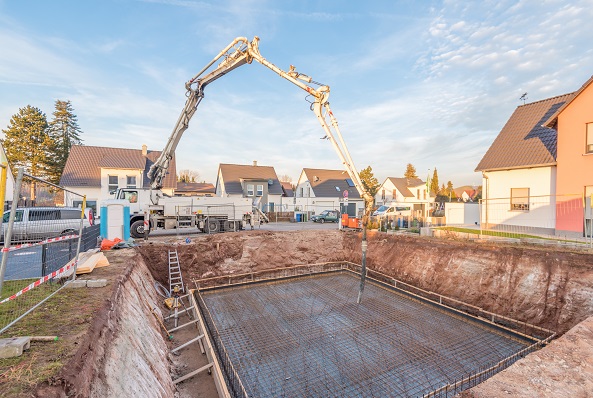If you are planning a concrete driveway installation, you should know that the strength of your driveway depends on its thickness. Many people often wonder about the appropriate thickness they should aim for, and this is where the expertise of professionals comes in. A concrete contractor knows that the thickness of a concrete driveway affects factors like strength and durability. The decision on the thickness to aim for will depend on weather conditions, traffic, and vegetative growth. These factors often wear the driveway, and so the contractor aims to prevent or delay their effects by choosing the right concrete thickness.
Concrete remains one of the most brilliant materials for pavement construction. When compared to other materials, it offers more life, durability, and strength. It can also be easily repaired. To understand the right concrete thickness for your residential or commercial driveway needs, you should first know the following information about concrete.
Should You Choose Concrete for your Driveway Installation?
Various features make concrete an ideal material for your pavement needs. Concrete is versatile and can be used in the construction of a wide range of structures. In addition to this, concrete is durable and requires low maintenance costs. To spice things up, you can choose concrete in different textures, patterns, and colors to match your specific needs. Choosing concrete for your driveway needs is much different compared to the black asphalt. While asphalt fades over time, concrete can retain its color for longer. In addition, asphalt will require frequent maintenance to ensure that it remains in top shape and appearance. Concrete installers often install a gravel bed under the upper layer of concrete to make it more durable.
How Thick Should Your Concrete Driveway Be?
The quality of your concrete driveway relies on the thickness of your concrete mix layer. The thicker the layer, the longer the durability and lifespan. For a residential driveway with minimal to decent traffic, concrete contractors aim for concrete slabs of at least 4 inches in thickness. In some cases, concrete contractors may decide to increase the thickness to 5 inches. The 1-inch increase adds about 50 percent more load carrying capacity and lengthens the lifespan of the driveway. Concrete contractors also pay extra attention to the edges of the driveway. This is because heavy traffic may damage the edges. For extra reinforcement, an inch or two may be added to the concrete driveway edges.
Factors Affecting the Thickness of the Concrete Driveway
The thickness of concrete driveways is not a uniform convention. Concrete contractors may decide to add a few extra inches based on several factors that may affect the durability of the driveway. Some of the principal factors that affect how thick the concrete will be include:
Type of Soil
Soil type and soil topography are two important factors that concrete contractors keep in mind when estimating the thickness of any concrete driveway. Different soils have different moisture retention properties. The amount of moisture in the soil can affect the quality of the driveway, and so the concrete contractor may be forced to increase thickness for soil types that have high water retention capacity. A good way to determine the adequate thickness is to conduct a soil analysis before the project is started. Areas with high moisture-retaining soils or highly expansive soils can have a structural base that is 3 to 6 inches high and a final later that is between 4 to 6 inches.
The Function of the Driveway
Residential driveways often experience light traffic and may not require much thickness. For most residential driveways, a thickness of between 4 to 6 inches is recommended. However, for commercial driveways with heavy vehicles and heavy machinery, a thicker driveway is recommended. Commercial driveways with salon cars will not require as much thickness as those dealing regularly with heavy trucks, moving vans, garbage trucks, and other heavy vehicles.
Installation Budget
A concrete contractor may also determine driveway thickness based on the client’s budget. If a client has a budget that will accommodate a 4-inch driveway concrete thickness, the concrete contractor is more likely to cast a 4-inch thickness. However, the contractor may cast a 5-inch concrete thickness for another client whose property has a similar soil profile but a higher budget.
Keeping Your Concrete Driveway Strong
Although the thickness of your concrete driveway matters, maintenance practices can also help to increase its durability. In addition to this, you can speak to your concrete contractor about using steel rebars. Steel rebars add about 1/2 -inch of strength to your driveway and improve its durability.









